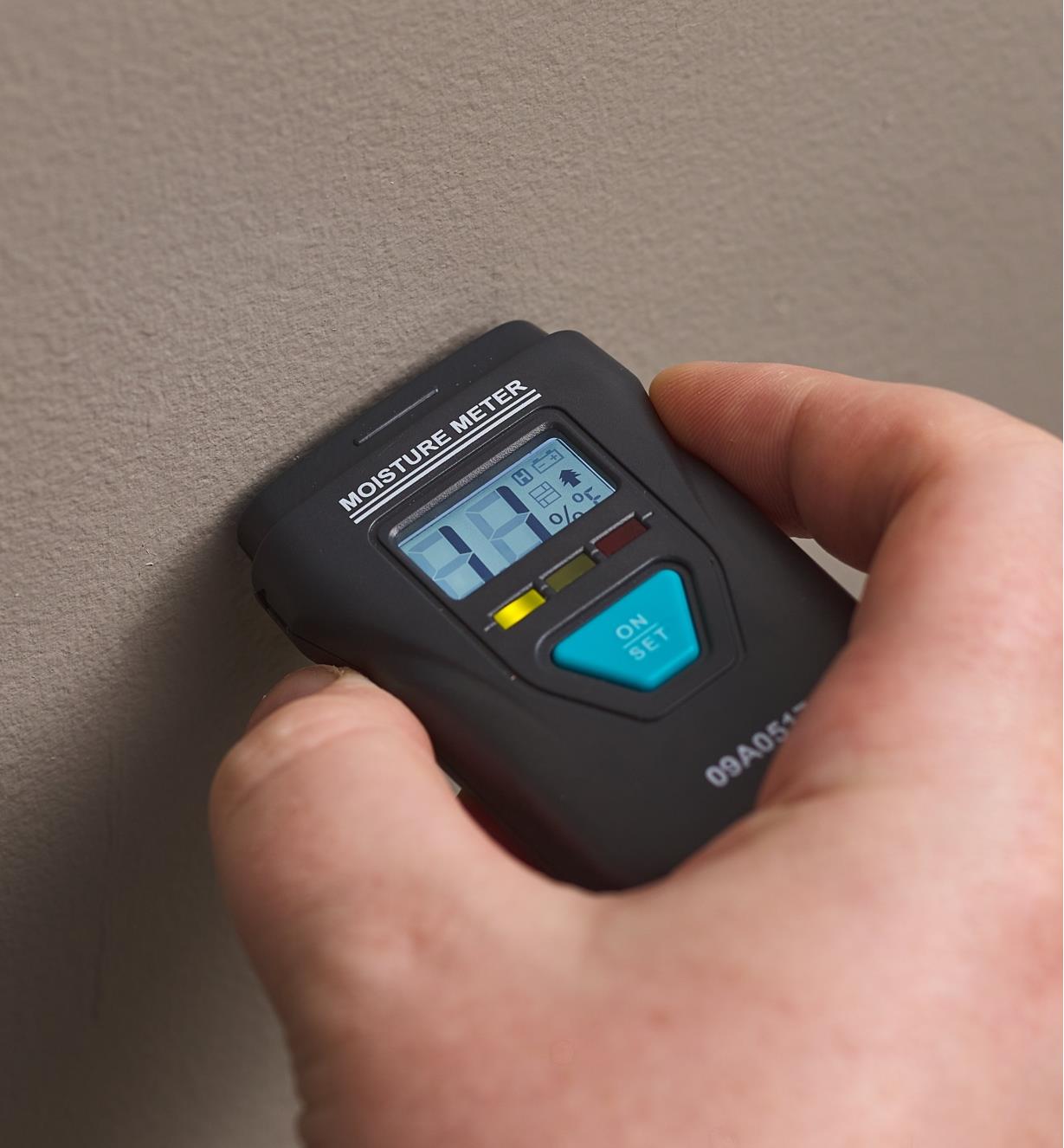Moisture Meter Purchasing Overview: What to Look for in High-Quality Instruments
Moisture Meter Purchasing Overview: What to Look for in High-Quality Instruments
Blog Article
The Ultimate Overview to Wetness Meters: A Comprehensive Review and How They Can Save You Money
Dampness meters offer as vital devices in detecting and monitoring moisture content in products, assisting in preventing costly problems and making sure the high quality of products. Recognizing the subtleties of various types of dampness meters, their applications, and the prospective cost-saving benefits they offer can be a game-changer for specialists and organizations alike.
Sorts Of Dampness Meters
One usual kind is the pin-type dampness meter, which gauges the electric resistance in between 2 pins put into a product. Pinless dampness meters, on the various other hand, use electromagnetic sensing unit plates to check a bigger area without triggering damage to the material's surface area.

Infrared wetness meters measure the thermal buildings of a product to determine its wetness web content non-invasively, making them beneficial for applications where pin or pinless meters might not be ideal. Understanding the various kinds of wetness meters available can aid sectors pick the most suitable tool for their details wetness measurement requirements.

Benefits of Making Use Of Dampness Meters
Moisture meters offer vital advantages in properly examining and monitoring dampness levels in diverse products and environments (Moisture Meter). One of the main benefits of using moisture meters is the prevention of possible damage brought on by excess moisture. By spotting and attending to high dampness levels at an early stage, wetness meters help to avoid mold and mildew development, rot, and structural damage in buildings, conserving both time and cash on repair services. Additionally, moisture meters aid in making sure the quality of products during building or manufacturing processes. By precisely gauging dampness content, these tools assist keep the honesty of wood, drywall, concrete, and various other materials, reducing the threat of failures or flaws.
Moreover, making use of wetness meters can lead to increased power effectiveness. In farming setups, moisture meters play a crucial role in maximizing plant yields by making it possible for farmers to monitor dirt wetness levels and make notified watering decisions.
How to Select the Right Dampness Meter
Selecting the proper dampness meter involves taking into consideration crucial factors such as product compatibility, measurement variety, and calibration accuracy. When picking a wetness meter, it's crucial to ensure that the meter appropriates for the specific product you will be screening. Different materials have differing electric homes that can impact dampness readings, so selecting a meter developed for your product is critical for accurate results. Additionally, take into consideration the measurement variety of the moisture meter. Ensure that the meter can identify dampness levels within the range required for your applications. Calibration accuracy is another vital factor to remember. Decide for a wetness meter with reliable calibration to guarantee consistent and accurate analyses. Some meters might need routine calibration adjustments, so understanding the calibration process is essential. By very carefully evaluating these variables, you can select a wetness meter that meets your needs and provides accurate wetness dimensions for your tasks.
Proper Techniques for Dampness Meter Usage

Expense Cost Savings With Dampness Meter Applications
Exactly how can the calculated utilization of wetness meters cause substantial expense savings across numerous sectors? Moisture meters play a crucial role in expense savings by stopping potential this website damage and guaranteeing top quality control in different sectors. In the farming industry, moisture meters aid in determining the ideal time for gathering crops, preventing over-drying or excess moisture that can influence the last item's quality. This precise tracking aids farmers prevent unnecessary losses and optimize their return.
In a similar way, in building, dampness meters help stop costly damages by discovering wetness levels in structure materials, Full Report such as timber or concrete, which can result in structural issues otherwise resolved quickly. By recognizing issue locations beforehand, professionals can take corrective steps to stay clear of comprehensive repairs or substitutes, inevitably saving time and money.
In addition, in the food handling market, wetness meters are important for keeping track of product quality and guaranteeing conformity with safety and security guidelines. By properly measuring dampness material in food products, makers can stop wasting, keep freshness, and reduce waste, resulting in significant expense financial savings. Overall, the calculated application of wetness meters is an important financial investment that can lead to substantial price decreases and boosted performance throughout various sectors.
Conclusion
In final thought, dampness meters are beneficial devices for gauging and detecting moisture degrees in various materials. By utilizing the appropriate wetness meter and following correct methods, customers can efficiently prevent pricey damages triggered by excess wetness. Purchasing a high quality wetness meter can cause considerable expense savings over time by identifying possible concerns beforehand and allowing punctual remediation. Eventually, wetness meters are crucial tools for maintaining the honesty and longevity of materials and structures.
Wetness meters serve as vital tools in discovering and keeping track of moisture material in materials, assisting in avoiding expensive problems and ensuring the quality of products. Infrared dampness meters measure the thermal properties of a product to establish its dampness material non-invasively, making them valuable for applications where pin or pinless meters may not be suitable.Wetness meters provide very useful benefits in properly examining and keeping an eye on moisture degrees in varied products and atmospheres. In farming setups, moisture meters play a critical duty in maximizing plant returns by allowing farmers to keep an eye on soil dampness degrees and make educated watering decisions.In conclusion, dampness meters content are beneficial devices for gauging and detecting dampness degrees in numerous products.
Report this page